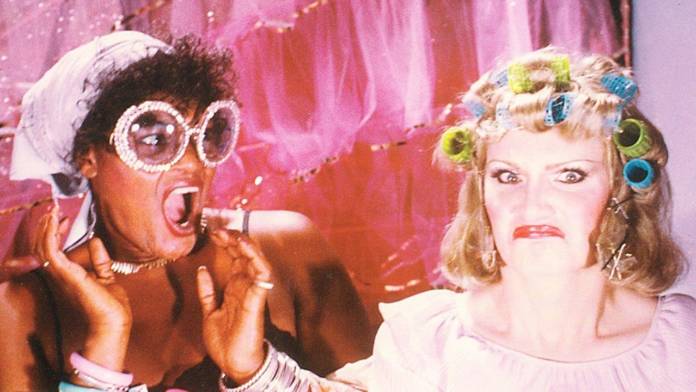FRAMELINE They just don’t make movies like City of Lost Souls anymore (playing at Frameline Film Fest Mon/24). What’s the last one you’ve seen that crams two anarchic song-and-dance-and-flog numbers, a giant hamburger, sausage fellatio, a trapeze duo, dark magic, full-frontal orgiastic group therapy, an elephant trainer, a gleefully racist little boy, deep gluteal massage and Ronald Reagan into its first 20 or so minutes? Rest assured, there’s never a dull moment in Rosa von Praunheim’s vignette-laden 1983 musical comedy.
Set in Berlin, primarily at the seedy Hamburger Queen diner and connected Pension Stardust, Praunheim’s movie flirts with biography and burlesque in its passive rendering of three decidedly active trans women: Angie Stardust, Jayne County and Tara O’Hara. It also trains its eye on erotic trapeze artists Tron von Hollywood and Judith Flex, taboo-flouting occult guru Gary, and Joaquin de la Habana, who functions as a melodic cheerleader of sorts. But under the thick and elaborate icing of the movie’s campy surface, there are true insights into the unmaking and remaking of identity.
Singing a knockout cabaret number about exile in front of a pointillist New York cityscape complete with the Statue of Liberty and Godzilla, Angie, with her arched brows and lashes, is tough and business-minded. However, one of the movie’s tenderest, quietest moments captures her in bed with her soft butch girlfriend. In comparison, the gap-toothed County—recipient of at least one ultra-glam Sternberg-style close-up—favors whipped cream slapstick comedy. Fond of crossing her eyes and prone to frenzied gesticulations, she’s also the only queen to embody a character with a different name. Her Lila somersaults from the groping of a craven nationalist politician to seduction by a caviar Communist before performing a punk rock anthem on East German TV.
City’s Venus Xtravaganza figure, young Southern belle Tara, uncovers serious topics through her casual approach to sex and passing. Referring to Angie as “old school,” she incites a necessary history lesson. “Hush and listen well, child,” says Angie, kicking off a monologue that concludes, “To you it’s the ‘old school,’ but someone had to take the first steps.” Later, when Tara brings a muscular blond himbo back to her spider-webbed boudoir, it’s a relief when her suspenseful verbal striptease has a happy ending. As Amos Mac observes in the queer film journal Dirty Looks, “Welcome to the contemporary, still-completely-valid-and-happening-every-day dating and sex life of a trans person.”
Not as disaffected as in Warhol (though County was an acolyte of Jackie Curtis), and more naturalistic than in Waters (there’s ample room for improv), City’s performances are nothing if not energetic and outsized. Petulant Tron von Hollywood is a hoot. There’s a bit of Marilyn Monroe’s ditsy genius and Andrea Feldman’s talent for tantrums in County’s performance, especially when childish Lila is forced to confront potential motherhood. In the queer movie periodical Little Joe, writer Adam Keleman describes Praunheim’s flair for “wildly amusing, soulful portraits of marginalized, idiosyncratic talents finding their place within a normative state,” and City, despite its frequent lampooning of entitled Americans, certainly fits the bill.
“In filmmaking, the private life must become public … in order to grow as a society you have to be open,” Praunheim tells Keleman. He adds that—rather than the “life is shit” depictions of bourgeois life favored by his contemporary Rainer Werner Fassbinder—he is drawn to “outstanding” characters and motivated by an “intense of love of people.” But in fact, as Vito Russo takes pains to detail within The Celluloid Closet, Praunheim’s early works are controversially unflattering “home movies of the gay movement.” From 1971, It Is Not the Homosexual Who is Perverse, But the Society In Which He Lives inspired scorn and discord from its target audience. By contrast, City is celebratory.
An activist leaflet of the era finds Russo heralding It Is Not the Homosexual…. as “Europe’s first gay liberation film.” By now, the 76-year-old Praunheim has made more than 150 films, partly because at the age of 70 he was challenged to make 70 movies, a monumental task he happily accepted. (“I don’t do computer sex, I’m afraid to lose time,” Praunheim also tells Keleman.) Within this impossibly large output, City of Lost Souls still stands out as a visionary and influential work. Whatever one thinks of John Cameron Mitchell’s Hedwig and the Angry Inch, many reviews note that City and County are major influences on it.
Dirty Looks’ editor and programmer Bradford Nordeen has been key to City’s rediscovery, and his essay “Playback Queens with Broken Dreams” provides extensive background about the movie and its three lead queens. Angie began performing at the age of 14. The first Black star at New York’s 82 Club, she broke from drag’s rules of showmanship with hormones and transsexual perspective and embodiment, and was fired for it. Punk trans trailblazers such as County—and San Francisco’s own Bambi Lake—followed in Angie’s high-heeled footsteps by emigrating to Berlin; Nordeen notes that City of Lost Souls “was first screened as part of a punk rock roadshow.”
Midnight movie and historical treasure, City of Lost Souls is, as Mac writes, “not only an important historical piece to the trans puzzle, but it views like a bible … a gold mine of authentic experiences of trans people in the form of a campy film.” Just as Angie schools Tara, Mac tells the “trans people of today” that “it is of the utmost importance for us to accept, recognize and most importantly HONOR the people who came before us … It is up to us to continue the family tree.” If watching City is one way of doing this, well then, it’s certainly a pleasure, not a chore. The living and the dead sing and dance together. Care to join?
FRAMELINE 43: CITY OF LOST SOULS
June 24, 9:15pm, $13-15
Victoria Theatre, SF.
Tickets and more info here.





